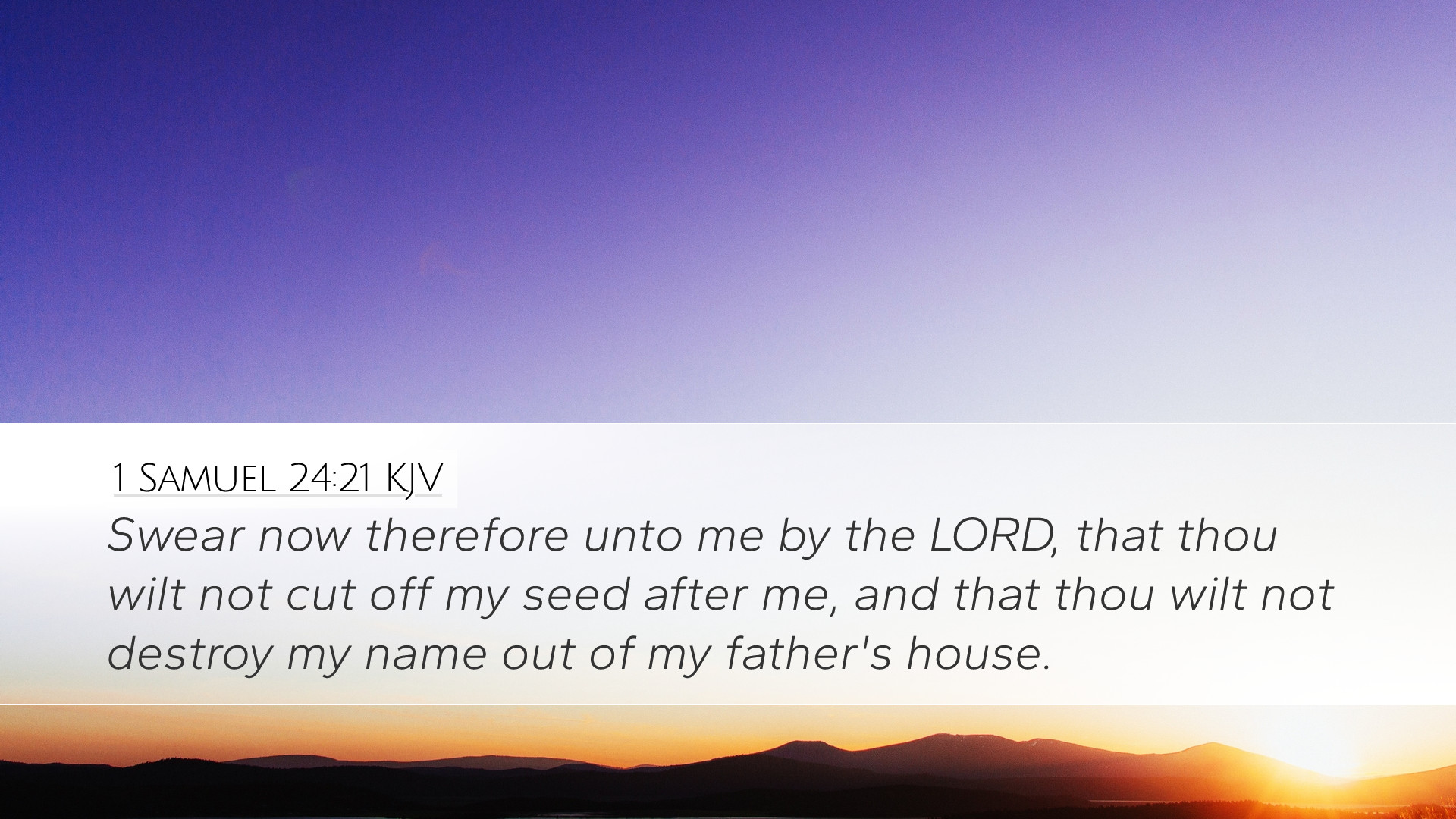1 Samuel 24:21 - Bible Commentary
Verse: "And now swear unto me by the Lord, that thou wilt not cut off my seed after me, and that thou wilt not destroy my name out of my father's house."
Introduction
This verse occurs during a critical moment in the narrative of 1 Samuel, where David spares Saul's life in the cave of En-gedi. It reflects the themes of mercy, covenant, and the importance of legacy. The plea of Saul showcases the depths of his fear regarding the continuity of his dynasty, tied fundamentally to the ancient Near Eastern customs of kingship and familial honor.
Contextual Background
The background of this passage is set against the escalating conflict between Saul and David, where Saul perceives David as a rival to his throne. David’s forbearance in not killing Saul in the cave highlights his integrity and the respect he has for the anointed of the Lord.
- David's Grace: David's act of mercy denotes a crucial aspect of godliness, encapsulating the potential for godly leadership that values human life even amidst personal danger.
- Saul’s Desperation: Saul's request for an oath indicates his deteriorating position and his understanding of the loss of divine favor. He realizes that his reign is nearing its end and seeks to secure a legacy for his descendants.
Analysis of Key Themes
1. The Nature of Mercy
The act of sparing Saul is a poignant reminder of the nuanced nature of mercy. David refrains from responding to Saul’s attempt to kill him with violence, instead opting for grace. This exemplifies a key teaching in the Scriptures regarding responses in conflict:
- David respects God's anointed.
- Mercy transcends personal grievances.
2. The Covenant of Legacy
Saul's fear relates to the ancient practice of ensuring one's legacy through descendants. His plea to David reflects an understanding of the covenant relationship that includes not just the individual but their lineage:
- Legacy in Scripture: The biblical narrative emphasizes the importance of continuity in family lines (e.g., Genesis 17:7).
- God's Promise: David, as the future king, represents God's ongoing plan for Israel, making Saul's plea increasingly poignant.
3. The Sovereignty of God
Embedded within this request is a broader theological principle regarding God’s sovereignty. Saul's decline is a direct result of his own disobedience (1 Samuel 15), yet he recognizes that God’s plan will prevail through David, furthering the messianic line:
- God's purposes often unfold in ways that humanly seem inscrutable.
- Through David, God will establish a kingdom that will lead to Christ.
Insights from Commentaries
Matthew Henry
Matthew Henry emphasizes the spiritual implications of this exchange. He notes how Saul’s plea is a vocal reflection of the insecurities associated with losing divine favor. Henry suggests that true leaders must consider the legacy of their actions on those who follow them, further framing the conflict in a spiritual light:
- Leaders are custodian of God’s purposes, not mere political figures.
- Henry underscores the need for integrity and compassion even toward enemies.
Albert Barnes
Albert Barnes approaches the text from a historical-critical angle. He references the socio-political landscape of ancient Israel, pointing out how Saul’s concern about his offspring is tied to the legitimacy of his rule:
- The pressure on kings to secure dynastic stability.
- Contextualizing Saul’s actions within the political norms of the time.
Adam Clarke
Adam Clarke offers a theological reflection, linking the verse to the nature of divine forgiveness and human relationships. His commentary reflects on Saul’s internal conflict, suggesting that his request for an oath is rooted in a recognition of his own failing:
- Clarke radiates a tone of sadness for Saul, highlighting the grace offered through David.
- The notion of grace under pressure is a recurring theme throughout Clarke’s exposition.
Conclusion
1 Samuel 24:21 provides rich material for reflection on themes critical to Christian leadership and personal conduct. It invites readers to engage with the complexities of mercy, legacy, and divine sovereignty. As pastors, theologians, and scholars engage with this text, it serves as a reminder of the continual interplay between divine will and human agency, urging an awareness of the legacies that their leadership may foster.


